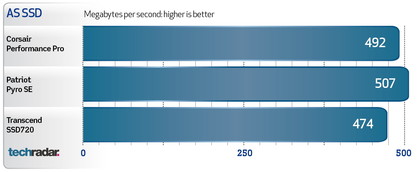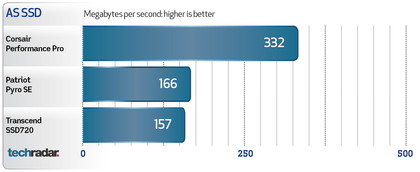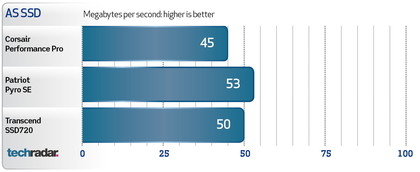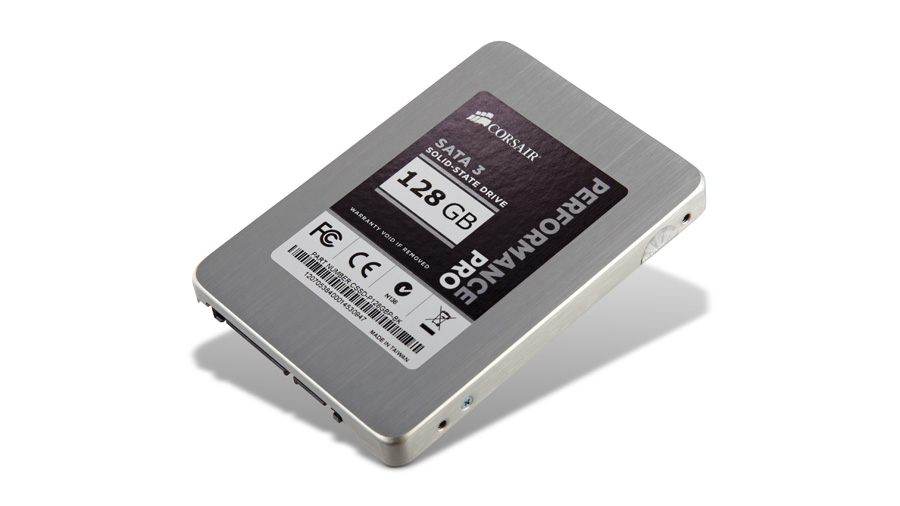TechRadar Verdict
Pros
- +
Excellent performance
- +
Background garbage collection
- +
512MB cache
Cons
- -
Price
Why you can trust TechRadar
Corsair has an extensive range of SSDs. This currently encompasses six product lines, including cache drives, and uses both Marvell and SandForce controllers throughout. This puts it in the enviable position of having a stake in both the most widely used controllers, giving it a distinct advantage over the majority of its competitors.
The Performance Pro is available in two capacities: 128GB (reviewed) and 256GB. That larger model comes with higher quoted sequential read/write figures of 515MB/s and 440MB/s respectively, and a price tag of around $400 if you shop around.
The controller at the heart of both drives is the Marvell 88SS9174-BKK2. This controller is joined by some speedy Toshiba Toggle NAND memory and a large chunk of cache, giving the drive some stunning performance figures.
The choice of NAND memory is especially interesting, because it's usually found in drives costing a lot more.
Vital stats
Capacity
- 128GB
Memory type
- 32nm Toshiba Toggle-mode MLC NAND
Memory controller
- Marvell 88SS9174-BKK2
Max IOPS
- 50K read, 60K write
Max sequential
- 500MB/s read, 340MB/s write
Interface
- SATA 6Gbps
Comprehensive
Corsair quotes sequential read/write figures of 500MB/s and 340MB/s respectively for the 128GB drive. These were pretty well backed up by the ATTO benchmark, which gave a read figure of 530MB/s and a write figure of 309MB/s.
The one advantage that the Marvell controller has over the SandForce is that it doesn't care about compressed or non-compressed data; it handles both without any problems.
That's not something you can say for the SandForce controller, which chokes on incompressible data, such as video and music files. This difference is clearly seen in the AS SSD benchmark results, where the read/write performance figures hold up well against the less intensive ATTO benchmark, with even an improvement in the write performance: 492MB/s reads, 332MB/s writes.
That write performance is over twice as fast as the two SandForce-powered drives it's up against. Boot time for the drive into a Win7 desktop was 31 seconds; a second slower than the Patriot Pyro SE 120GB, but a full six seconds faster than the Transcend SSD720.
Benchmarks
Sequential read performance

Sequential write performance

4K random write performance

Making up the drives 128GB capacity are eight 16GB Toshiba 34nm Toggle MLC NAND modules, which sit on one side of the PCB along with a couple of Nanya 1,333MHz DRAM modules which provides the drive's 512MB cache.
Unlike the SandForce controller, the Marvell uses those DRAM modules instead of part of the NAND memory. The only thing housed on the flip side of the PCB is the Marvell controller. Since the drive doesn't use any of its capacity for over-provisioning, the only space you lose is to Windows formatting, which reduces the drives capacity to 119GB.
The Corsair not only supports the TRIM command, it also has background garbage collecting that works when the drive is idle to help keep that out-of-the-box performance. The Corsair Performance Pro may not be the cheapest 128GB solid-state drive around, but it's stunning when it comes to providing overall performance.
